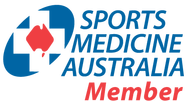A key metric on whether or not I am a good physio is: "Do my patients get better?"... Most patients do get better (unfortunately not all***), and I'll ask them at the end, what made the difference? Was it the hands-on treatment?, taping?, ice?, heat?, tablets?, stretching? strength exercises?, or natural recovery? It's not always obvious to the patient what made the biggest difference to recovery and patients will tell me all sorts of things. However, I'm very confident the most important component of whether or not they get better is "Do they do the rehab exercises I give them?". So I think, whether or not I am a good physio, comes down to:
There are some very good physios around who prescribe very thorough rehab programs, working on this-or-that stabiliser, or this-or-that kinetic chain. 20 exercises, head to toe. Gold plated. Which is great, except I'm just never going to get 20 exercises done. "Doing" the one most important exercise is always going to be more effective than "not doing" 20 thorough exercises. So my recommendations are always:
So you've got one job to do. You'd think that would work?... Nope. It's really hard to get something done. One exercise - it should be easy, but it's not. And it's not that it takes too long, or it's inconvenient. You can do it anywhere, anytime. The problem is remembering to do it. You remember to do the exercise when you're in the middle of something else, you think "I'll do it later", and you just don't remember. You crawl into bed at the end of the day: "Bugger. Didn't get that exercise done. I'll do it tomorrow". Then you've missed a day. Maybe you've missed a whole week. So how do you remember to do the exercise? Set an alarm? - The alarm goes off when you're in the middle of doing something else. "I'll do it later." I think the best way is to "marry" the exercise to something that happens regularly in your day already. I've heard people recommend doing their exercises when they brush their teeth. Your doing it twice a day already. But quite often you're running late for work in the morning and don't have time, or you're too tired before going to bed... "I'll do it later." I suffer with a tendinopathy from time to time. I reckon I'm good for one a year. Sore Achilles, or a tennis elbow. It's a peroneal tendinopathy at the moment. I've got a pretty good routine for them to settle in a week or two if I do isometrics. I try and get 10 reps/day of a 30 second contraction. It works well for me. But how do I remember to get them done through the day when it's not constantly sore and pain isn't reminding me? I marry the exercise to having a drink. I know I'll have about 10 drinks through the day; a couple of coffees in the morning, glasses of water through the day, a couple of cups of tea in the afternoon, and maybe a beer at night on the weekends. Having a drink reminds me to do the stupid exercise. And I'm only going to have a drink when I've got a minute spare, so it's also the opportunity to get the exercise done. Memory aid, opportunity, and hydration, wrapped into one. Cheers to that. *** Not all patients get better...
Is it my fault or their fault? I'd like to blame them, but I have to acknowledge it's probably my fault. Some disappear and are never heard from again. I can only presume they've (1) gotten better, or (2) didn't like me. I do try and give them all a call to find out. Some people don't get better and I think it's often a failure of mine to find the explanation of their problem that resonates with them enough, so that they do the rehab exercises I recommend. I don't find the "hook" for them and It ends up frustrating for both of us. I had Osgood Schlatter's Disease myself in both knees as a kid. Mum entered some fun-runs in the 80's and we used to go running together. I was training more than I should have for cross-country running in years 5, 6, and 7, and suffered terribly. Terrible night pain - I used to cry. Mum took me to a GP who confirmed the diagnosis with an x-ray and told me to stop running. Crazy sounding diagnosis. It sounded absolutely bizarre to my 10 year old ears. I ran less, and it eventually stopped hurting. I've still got decent bumps on my tibial tubercles to show for it. Osgood-Schlatter's is an overuse injury of the spot where the quadriceps muscle attaches on the front of the knee (tibial tubercle). It’s the tendon where the quads anchors onto the tibia. It get’s sore with too much running, jumping, and kicking. Usually 9-12 year olds. Quite often if they’re having a bit of a growth spurt while they’re doing a lot of training. The body is busy spending its resources on the growing, and so the recovery between training sessions doesn’t keep up.
It’s usually sore after training when you cool down. It can ache in bed at night. We say that it is self-limiting, which means it eventually gets better when you stop growing, but who wants to wait that long? There’s no long-term problems from it. Once it stops hurting it’s all OK. It doesn’t need an x-ray or a scan, or any injections or surgery. It's an easy clinical diagnosis and simple conservative management. DO:
DON’T:
It’s really a matter of adjusting the running load day-to-day depending on how sore it is. If it’s sore - do less. It's an injury that needs managing through the season. I try and get kids to do a bit less running at training and save it for game day. If it's sore on game day and you need to keep playing, it's safe, in that, it's not going to snap or pop. But it will hurt more for longer if you push through, which is what just has to be done some times. Funny sounding name. Not funny at all when it's sore.
|
�
Archives
July 2024
Categories
All
|
|
|
MENU
|
INJURY INFO
|
INJURY INFO
PHYSIO MOSMAN |
Copyright© 2024| Fit As A Physio | ABN 62855169241 | All rights reserved | Sitemap


 RSS Feed
RSS Feed



